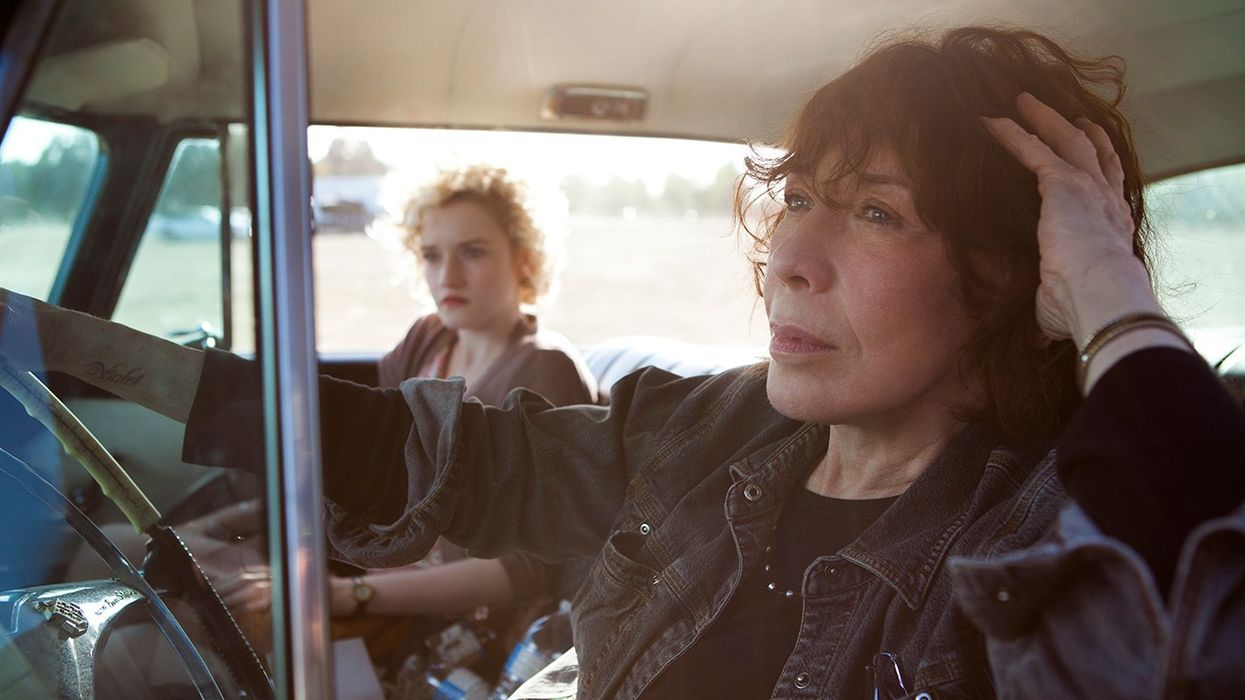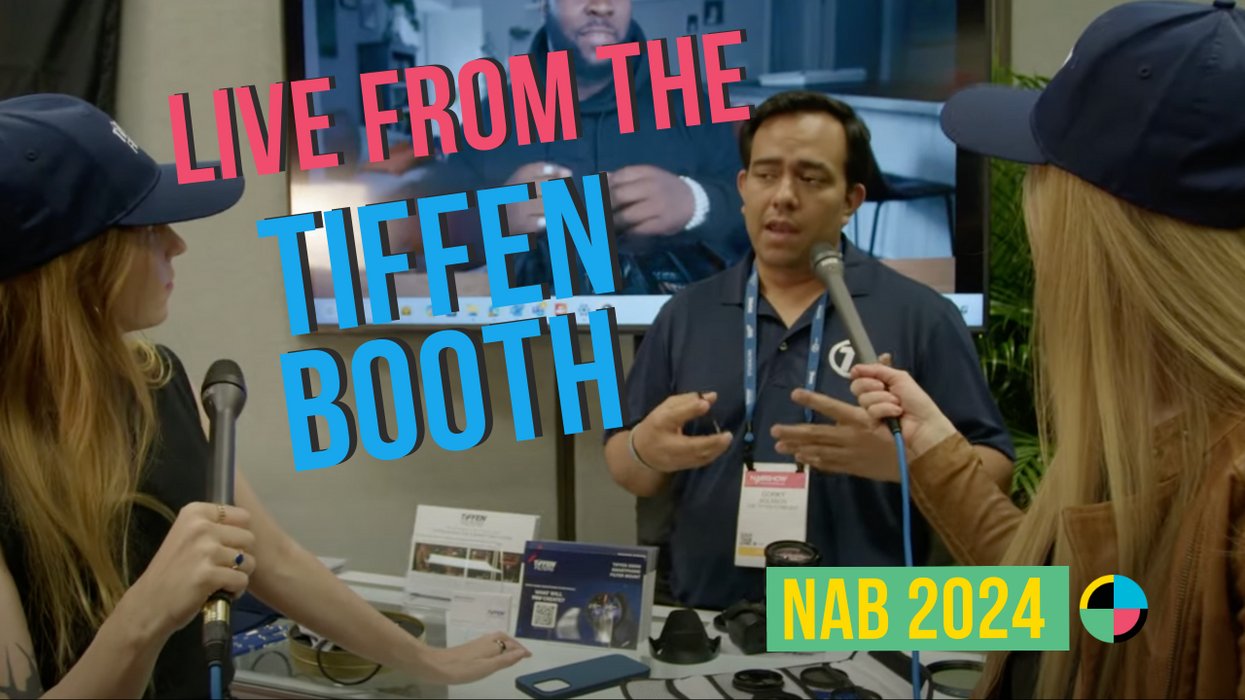Scaling Down, Gaining Control: Paul Weitz on Directing His Low-Budget Film Starring Lily Tomlin
Paul Weitz has has had a long career as a writer & director on films of all sizes, from About a Boy to American Pie. This year he's unveiling the lower-budget Grandma; his answer to the lack of control he's felt within the studio system.

I caught up with Paul on the 12th floor of a building in NYC during Tribeca to discuss working with actors, lighting for speed, simplifying his storytelling and what Billy Wilder might do if he had access to digital cinema.
NFS: I appreciate a good 24-hour story. I made a 24-hour film last year -- well it took almost 5 years, but I released it last year.
Paul: 5 years to write it?
NFS: 2.5 years of writing, 1 of existential crisis, 1 of shooting and post.
Paul: Well, it's good not to have the existential crisis while shooting it. The first film I ever tried to make in college was meant to be a 4-day shoot. And after the first 2 days I kinda had a breakdown. My dad was loaning me money to make it and I thought, "Oh god, I'm wasting my dad's money." And I pulled the plug on myself. So yeah, I'm glad I got another chance to do it.
NFS: That's what it's kind all about: finding ways to create another chance to do it. You're not gonna get it right every time -- it's a gamble.
Paul: There's a large part of one's life potentially lived on sets. Yeah you're making these films, but you're spending a lot of time actually physically doing the thing. It's easy to only prioritize how the movie turns out as opposed to the experience of making it.
I just wanted to have more of a feeling of control and not feel beholden to anybody in terms of the storytelling.
NFS: Have you made a 24-hour story before and what do you find is interesting about those parameters?
Paul: I haven't. Specifically I was feeling like, in terms of my filmmaking, the storytelling was getting too convoluted. Which sometimes is a good thing and sometimes can be a distraction. So, I actually wanted to pair something down and do something really simple in terms of the storyline and have whatever complexity the film had echoing off that. But also I was inspired by the film Oslo, August 31st.
NFS: Amazing film...
Paul: Yeah it's fucking amazing. This is an utterly different kind of movie, but it reminded me of the power of having something play out in rapid form.
NFS: The ability to dig deep into the smallest things that explain everything -- it always impresses me when a filmmaker is able to pull that off. In your film we spend one day with them but we get their whole context. When you're writing how do you attack the small moments?
Paul: In this case I was writing something specifically to shoot with an extremely low budget. I just wanted to have more of a feeling of control and not feel beholden to anybody in terms of the storytelling. If you look at a 17 year-old and a 80 year-old you think that the 17 year-old is more edgy. But the reality is that a lot of those people in their 70's people were coming of age in the 60's when there was complete social turmoil and where people were extremely vocal about their beliefs. And in the case of Lily [Tomlin] I knew she had gone through so much feminist history and gay history that I was able to write this thing totally for her.
I didn't ask her if I could write something for her, so I would've kinda been in trouble if she hadn't agreed to do it. But I gave the script to her and we picked over it for months in terms of character realism and politics and stuff. She's married and has been in a long term love with her wife Jane Wagner for over 40 years at this point. So I took that and thought what if someone had a 38 year relationship with someone who died before they had the right to marry? And what would that do to somebody who is by nature sarcastic and edgy.
Frankly, if you're working in drama or comedy, those things are not subject to budget as much.
NFS: How did working on a lower budget inform how you lit the movie?
Paul: A huge part was working with the cinematographer Tobias Datum. I chose all crew people who had done low budget stuff instead of asking favors from people I had worked with before. He lit the stuff so I had a lot of time to work with the actors. He had done a lot of low budget films. The first day of shooting I asked Toby to light stuff so I could just keep going. When I realized he had already done that it make things much easier. I feel like I always forget what I'm doing on the first day of shooting. I'm just trying to remember how pieces of film fit together. He lit stuff ambiently so that the actors never had to stop if they didn't want to.
NFS: So you spent an hour or two lighting? Sometimes not even?
Paul: Sometimes not even. He was just very laid back, but he also had a good aesthetic and is very talented. It was a 19 day shoot so I didn't have time to shoot stuff that wasn't in the movie. Sometimes when there's a more luxurious shoot you shoot stuff to see if it's gonna work. Then I feel really guilty because sometimes the actor's performance does really work, but later I cut it for the story. And I regret it later. I mean does it really make a difference if the movie is 3 minutes longer? Apparently not.
NFS: My film was a 19 day shoot too. It seems like the sweet spot; 19 days = 24 hours on film. Did you shoot chronologically?
Paul: Actually it sorta worked out that way. The problem with shooting out of order is if there's an actor that you haven't had enough time to talk through the script with it can be disorienting for them. But I had plenty of time with Lily Tomlin.
I was scared of doing it but I thought what the fuck? The real thing to be scared of is standing out in the highway with a big release.
NFS: So when it came to shooting did you let her go or was there a lot of fine tuning?
Paul: Like a lot of extremely talented actors, she's very self critical. So sometimes it's about telling her, "No, that was good what you just did." It's funny, I think she wasn't sure what the experience was gonna be like until she got on the set. But I surrounded her with actors who she liked and respected. Like Judy Greer for instance, they are both from Detroit. And Lily had a real good feeling about Julia Garner from the first time she saw her picture that she would be an interesting person to spend this whole movie with. And Marcia Gay-Harden was someone who Lily seemed slightly intimidated by. It's the only person I've seen Lily respect / be intimidated by and that worked for that character. Her daughter is supposed to scare her a little bit. Once we got going Lily felt completely relaxed. I think it's pressure carrying a movie, and she's carried a one-woman show. We finished shooting at like 3 am on a Saturday and that night she did a 2-hour one woman show in Northridge. So she's got prodigious amounts of energy.
NFS: It seems like a lot of filmmakers who are at different stages in their careers are kind pairing down. Bringing budgets down, schedules down, just bringing the fuss down. What controlled your instinct to pair down on this?
Paul: In a lot of ways that instinct was spurred on by a feeling of a lack of control. Usually I like to be on the set of another movie when one comes out. I had gone back to back on a bunch of films and I felt like, "Man, I have zero control." I think a lot of people are drawn to directing because they are slightly control freaks and it's sort of a sanctioned way of being a control freak. And also I've always been a fan of the Dardenne Brothers films, I love L'enfant and La Promesse.
A lot of the films I've liked over the last year have been really low budget films, like Starlet by Sean Baker. I've been watching these films and enjoying them, so I thought I should make one. I was scared of doing it, but I thought what the fuck? The real thing to be scared of is standing out in the highway with a big release. I always think about Billy Wilder and towards the last 15-20 years of his life he didn't make a film. His skill was largely in screenwriting, so I always wonder if he had access to digital cinema and could make something for the hell of it what he would've come up with.
NFS: That's great that if for some reason or another you don't have access to the big machine that you're used to, to find a new way to put yourself into this stuff.
Paul: Also, I do think that the emperor has no clothes on in terms of, if you're the Avengers or something then that is the exact right way to release your film, in a massive release using the studio system. That's all dying because people don't watch films like that anymore. And that's a bummer, but it's also great because it evens the playing field massively. Someone can make a film for a few hundred thousand dollars or less even. Also, if you're working in drama or comedy, those things are not subject to budget as much as VFX films now, though you can do really interesting low budget stuff with VFX films, too. So yeah, it was pretty freeing.
Thanks, Paul!













